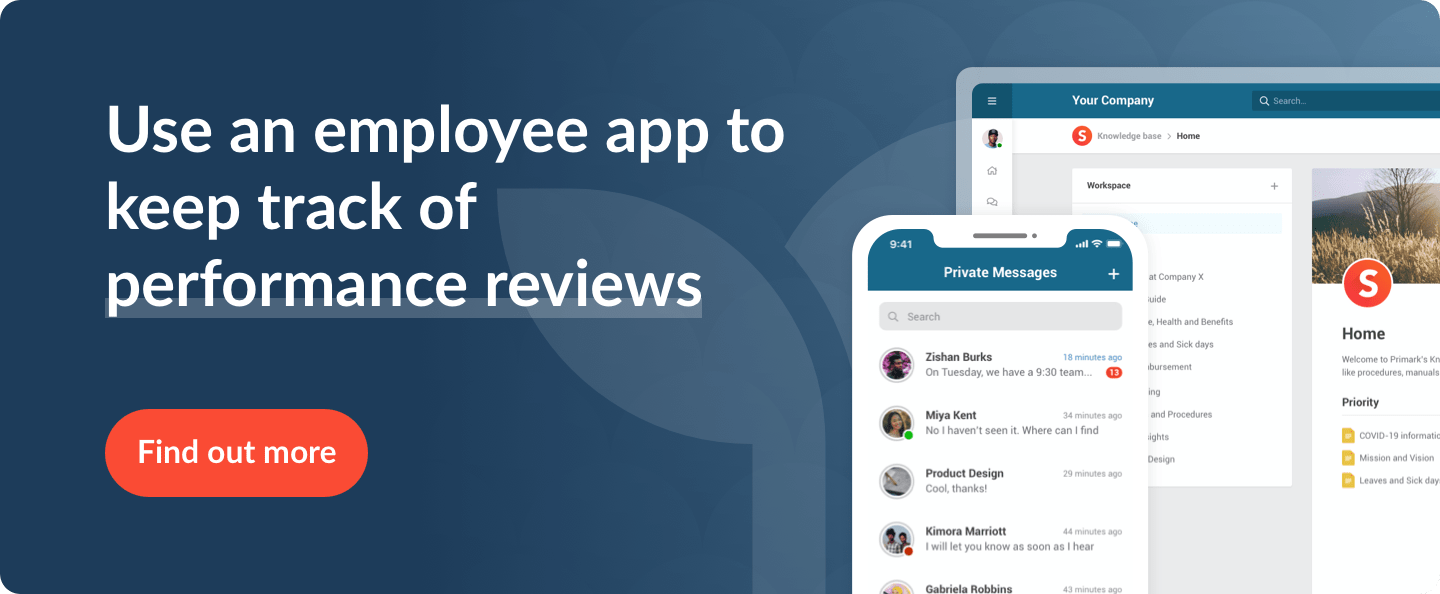4 Tips for Performance Reviews With Frontline Workers
Performance reviews can be scary. But they don’t have to be. They’re simply designed to review your employees’ progress, highlight areas for improvement and implement strategies for skill development. It’s a dedicated moment to help employees improve their skills, efficiency and confidence.
The toughest part of performance reviews for HR might be around connecting with frontline workers who are generally out of reach, deskless and dispersed. But fret not, our specialists have put together 4 key elements to facilitate your performance reviews with frontline workers, and help you make the most out of this moment to improve employee experience. 
#1Increase check-in moments with frontline workers
Don’t postpone conversations with your frontline workers, especially in regards to end of year performance reviews. Instead, increase touch points throughout the year and create regular check-ins with your employees.
Use surveys or scheduled chats to keep connecting with your dispersed frontline workers. Surveys can act as a good employee communication tool to receive feedback and know what’s working and what isn’t. It can also be anonymized, making the touch point easier and more comfortable for some. Surveys are especially useful for reaching out to frontline workers who aren’t always within proximity.
Address problems as they arise, ensuring that you cut them at the root, at the right time. Just because you’ve scheduled a performance review doesn’t mean you can’t act earlier. Move around a few meetings and make time for these frontline workers when appropriate. It’ll show them that you’re interested in their daily lives, and that your company cares about employee well-being.
#2
Set the right tone for your performance review
A performance review can be a source of anxiety for many frontline workers. It’s important to keep that in mind and to act accordingly.
Acknowledge the unsettling impact that a performance review can have on your frontline workers. Understand and approach employees with all the appropriate nuances. Take into consideration your frontline workers’ diverse backgrounds and cultural differences. Acknowledge that across the company there might be diverse department cultures that you should approach differently. Be sure to develop your employee communication strategy, tactics, and messaging accordingly.
Recognize that it’s a two-way conversation. Ensure that the frontline worker knows that they too have a voice before starting the performance review. This will help them prepare for the performance review, and help them reflect prior to the conversation.
#3
Put frontline workers at the center of your performance reviews
It’s important to remember what the performance review is all about: the people in your organization.
Look beyond the goals. Try to look at how the frontline worker achieved the outcomes, and ask the necessary questions to gain a better understanding. It’s important to acknowledge the employee’s ability to demonstrate company values, solve problems and execute with limited guidance. Look at these factors and at how they have improved over time.
Encourage frontline workers to explore their career paths. Effective performance reviews individualize employees and address their growth track. It’s up to the organization to bring this up and to show opportunities. The reward? Retaining star frontline workers who contribute and grow into managers and leaders themselves.
#4
Keep track and get feedback
Performance reviews work best when everything is documented.
Don’t rely on your memory, but instead write everything down. What doesn’t seem significant right now could become significant over time. And some things you do remember could become skewed – beware! A good practice is to include supervisor comments on a regular basis, making the next performance review even more productive and insightful.
Ask frontline managers to regularly document. Keeping track works even better when everyone is using the same practice and methods. Encourage managers across departments to keep track of their performance reviews, as well as to list any important achievements of their frontline workers. And get an employee experience app to streamline the process!


